The best waterproof jackets for road cycling and commuting in the wet will make what can be an unpleasant situation much better, and, dare we say it, even enjoyable.
Investing in a decent waterproof is advisable for anyone, but especially those who take to winter cycling. Cold and wet conditions can combine to make riding an unpleasant experience without the right kit.
Old advice might have been to toughen up – a baggy, ‘boil in the bag’ rain cape would soak you through with sweat anyway – but waterproof fabrics have evolved massively in recent years.
With that in mind, we’ve compiled a comprehensive list of the best waterproof jackets for cycling, as tested by the BikeRadar team, to help you with cycling in the rain.
Our expert testers have ridden in all conditions to bring you great options for both road cycling and commuting. If you ride off-road, we've got a separate article on the best mountain biking jackets.
Otherwise, you'll find BikeRadar's top-rated waterproof cycling jackets below – or skip to the end for our buyer's guide on choosing the right jacket for your needs.
For more advice on kitting yourself out for bad weather, we've got guides to the best winter cycling shoes and best overshoes to keep your feet warm and dry, plus a round-up of the best winter cycling gloves.
Editor's note: this list was updated on 8 January 2025, with our most recent waterproof cycling jacket reviews. We have also included guidance on how we test waterproof cycling jackets and why you can trust BikeRadar.
Best waterproof cycling jackets
Bontrager Velocis Stormshell jacket
SQUIRREL_TEXT_13151599
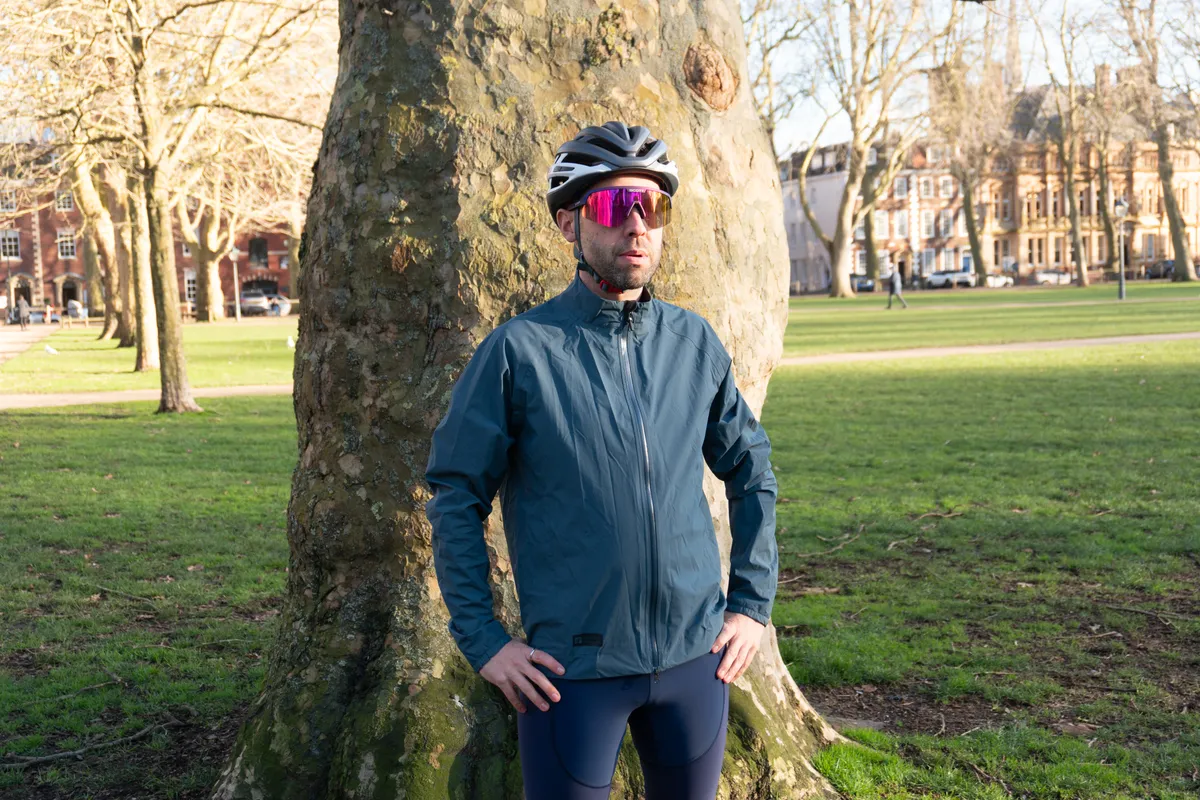
- £154.99 / $139.99 as tested
- Pros: Superb water protection; versatile; good fit
- Cons: Pricey; not many pockets
The Bontrager Velocis Stormshell keeps you dry inside and out. Rain doesn’t penetrate the hydrophobic nylon, while your sweat escapes pretty well.
Due to its comparatively relaxed fit, the Velocis Stormshell can be used for gravel riding and commuting, as well as foul days on the road.
The absence of pockets means the Bontrager Velocis Stormshell has no storage and isn’t that easy to stash in a jersey pocket.
- Read more: Bontrager Velocis Stormshell review
SQUIRREL_13151599
Castelli Emergency 2 W Rain Jacket
SQUIRREL_TEXT_13114705
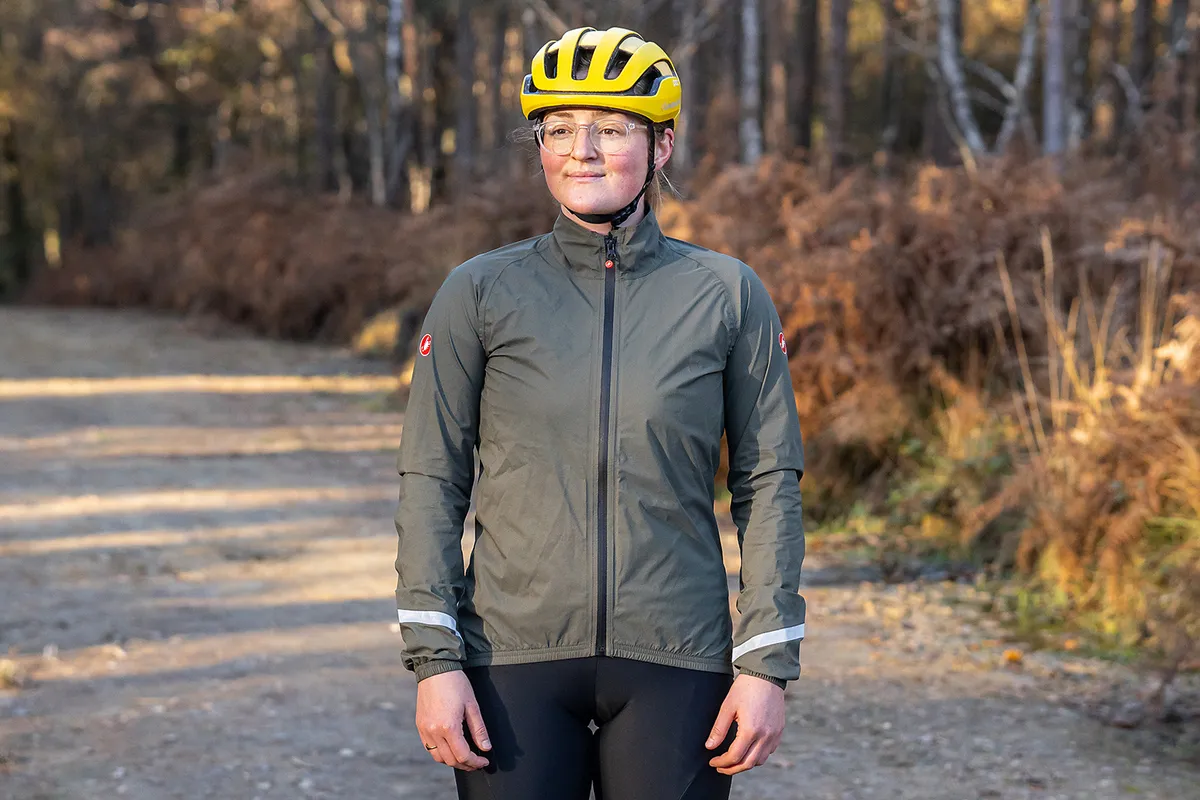
- £165 / $140 / €150 / AU$225 as tested
- Pros: Properly waterproof; easily stashable; well-made
- Cons: Loose fit
The Castelli Emergency 2 W is a women's specific rain jacket that's easily packable.
Castelli has used a multi-layer polyamide fabric shell with taped seams and a waterproof zip. It proves to be waterproof and windproof even in the UK's mild winter weather.
This women's version of the jacket is loose over the torso and arms, but it's true to size and our tester appreciated the high collar for wind protection.
It's not the cheapest option on the market, but it warrants the investment.
- Read more: Castelli Emergency 2 W Rain Jacket review
SQUIRREL_13114705
Gore Torrent
SQUIRREL_TEXT_13151603
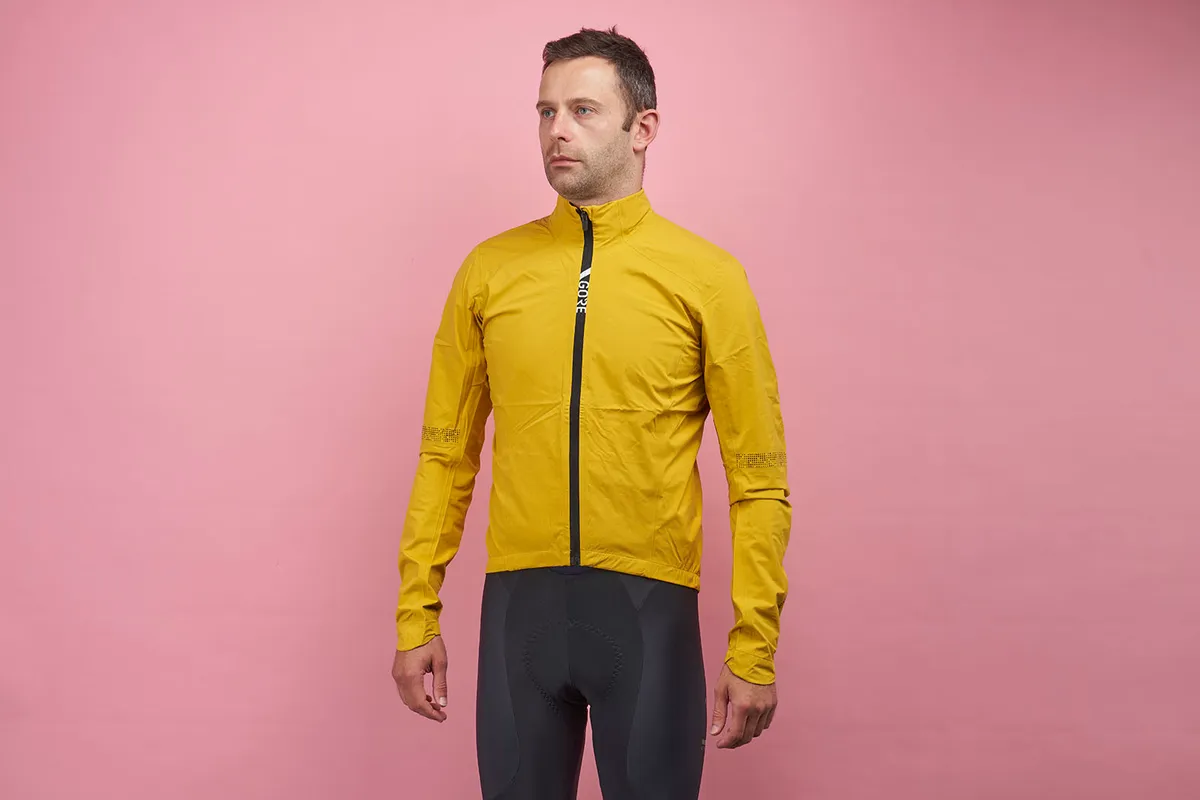
- Price: £230 / $230 / €230 as tested
- Pros: Cropped fit; highly breathable and waterproof
- Cons: Sizes small; pricey
The slim-cut Gore Torrent jacket uses the brand’s excellent Gore-Tex Active fabric. While it’s roomy in the arms, it isn’t as long as some and you may want to size up if you’re bigger round the chest.
The zip has an inner liner and reflective touches are minimal. The collar has a soft fleecy lining and there’s a small zip garage.
On the rear right, there’s a large, zipped pocket, but it can be tricky to find the slim pull tab with gloves on.
The waist hem is lightly elasticated with a gripper, and the fairly long cuffs are partially elasticated.
Waterproofing and breathability of the fabric are excellent, with no hint of wetting out through testing, even after repeat washes with a tech-wash product.
- Read more: Gore Torrent review
SQUIRREL_13151603
Maap Atmos
SQUIRREL_TEXT_13151605

- £270 / $345 / €295 / AU$395 as tested
- Pros: Light and easily packable; highly breathable; slim yet agile cut
- Cons: Pricey; no pockets
Maap's Atmos jacket is a great performer that does a decent job of keeping water away while remaining highly breathable.
We found it to be easily packable despite the lack of pockets and liked the jacket's slim cut that doesn't restrict moveability.
It is at the pricey end of the spectrum, and having no pockets might rule it out for some.
- Read more: Maap Atmos review
SQUIRREL_13151605
Albion Men’s All Road Pertex Shield Rain Jacket
SQUIRREL_TEXT_13154695

- £210 / $295 / €310 as tested
- Pros: Breathable; useful waterproof; extra protection from its construction
- Cons: More expensive outside UK; too bulky to fit in a jersey pocket; short arms
This rain jacket from British brand Albion is well made, high quality and PFC-free.
The jacket uses Pertex Shield fabric, which breathes as well as equivalent materials from Gore-Tex and proved waterproof when the heavens opened.
It sizes slightly smaller than claimed and the arms are slightly shorter than we’d like. But fit is always a subjective consideration.
We appreciated the finishing of the jacket, with its long back, elasticated grippers and adjustable wrists. We were also impressed by the chest pocket.
There’s a lot to like here, but it’s worth noting that this jacket won’t pack down into a jersey pocket and it costs considerably more outside of the UK.
SQUIRREL_13154695
Altura Icon Pocket Rocket Jacket
SQUIRREL_TEXT_13151606
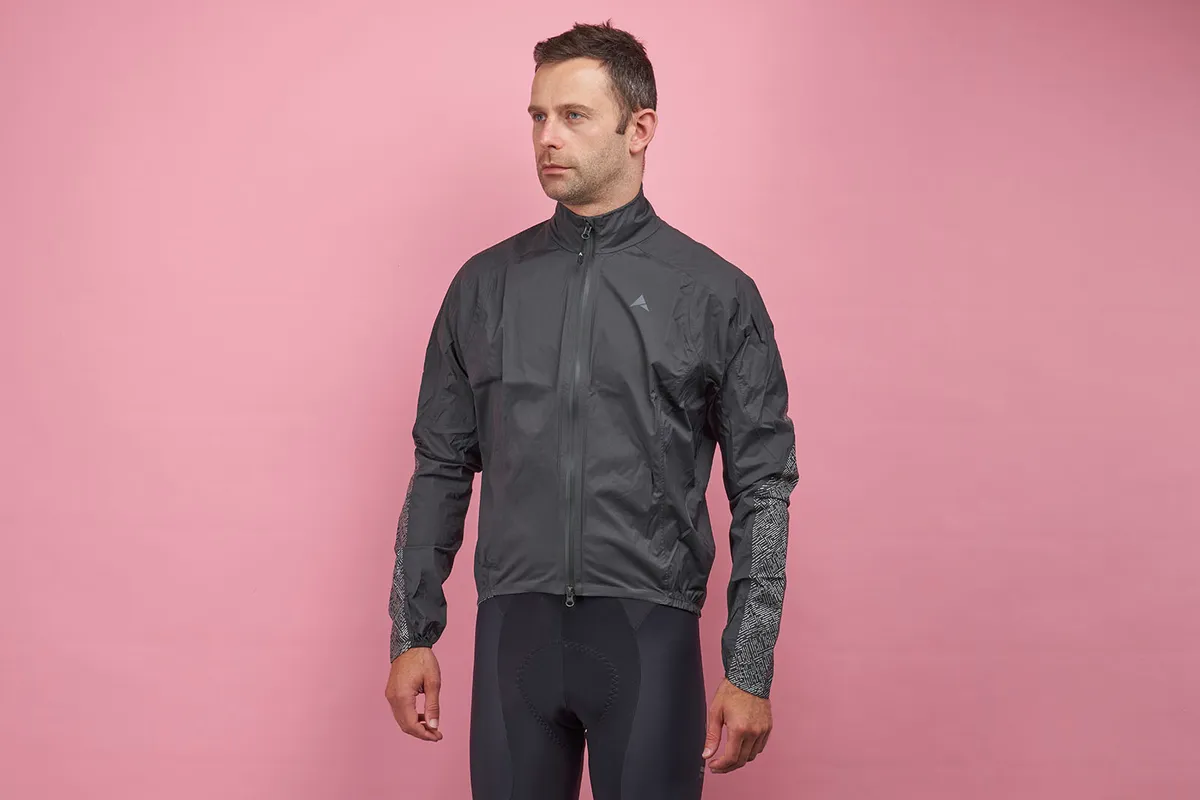
- £125 as tested
- Pros: Reasonably waterproof and breathable; well-priced; packs well
- Cons: Slightly baggy
The Altura Icon Pocket Rocket’s slightly stretchy fabric is waterproof and breathable to a decent 10,000mm.
The seams are taped and the DWR (durable water repellent) coating is PFC-free.
Although there was some wetting out in extreme rain, it didn’t penetrate the fabric. Breathability is good too.
Well-thought-out details include a two-way, sealed zip with internal backer, rear pocket and partially elasticated waistband with silicone gripper.
It has a usefully long back, but for our tester, there was a little excess fabric on the upper arms and body, which could flap in the wind.
- Read more: Altura Pocket Rocket review
SQUIRREL_13151606
Endura FS260-Pro Adrenaline Race Cape II
SQUIRREL_TEXT_13151607

- £90 / $110 / €110 as tested
- Pros: Quality cuffs; good wind and rain protection; race number remains visible
- Cons: No outer pockets; not the most breathable
The Endura FS260-Pro Adrenaline Race Cape II offers great wind and rain protection while remaining small enough to stash in a rear pocket.
We found the jacket to fit well and the cuffs remained comfy over longer durations.
There are more breathable jackets out there, and the lack of pockets will be a letdown for some.
SQUIRREL_13151607
Gore Spinshift Gore-Tex Jacket
SQUIRREL_TEXT_13154699

- £250 / $270 / €250 as tested
- Pros: Good cut; very breathable; as waterproof as it needs to be
- Cons: Not as protective-feeling as others
The Gore Spinshift Gore-Tex Jacket is a great choice if you want a slim-fitting, PFC-free cycling jacket.
The Gore-Tex ePE fabric is extremely breathable and is waterproof even in prolonged heavy rain. The flipside of this is it doesn’t offer as much protection as Gore’s heavier-duty jackets, so we’d advise using the Spinshift only in milder weather.
The jacket is also packable into a jersey pocket and it’s more affordable than some key competitors.
- Read more: Gore Spinshift Gore-Tex Jacket review
SQUIRREL_13154699
Rapha Core Rain II
SQUIRREL_TEXT_13114776
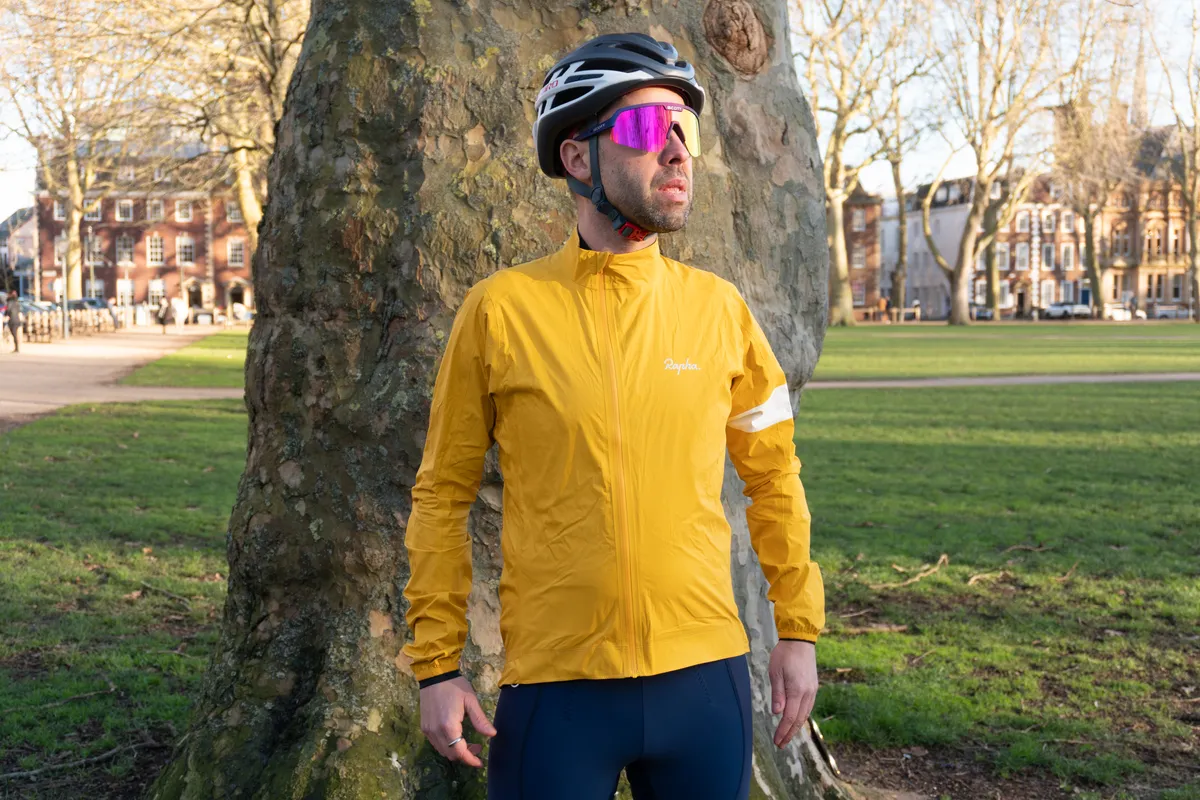
- £110 as tested
- Pros: Top-class waterproofing; decent value; stylish and comfortable
- Cons: Little storage and no pocket to pack into
The Rapha Core II is an excellent waterproof jacket for cycling in sodden conditions. A dropped tail, and elastane cuffs and collar help ward off the wind.
Because it's cut looser than some Rapha garments, you can fit a baselayer and winter jersey beneath.
Breathability isn’t fantastic, but respectable for a waterproof jacket at this price.
The Rapha Core II is let down slightly by its lack of pockets and propensity to stain.
- Read more: Rapha Core Rain II review
SQUIRREL_13114776
Rapha Gore-Tex Rain Jacket

- £300 / $380 / €345 / AU$500 as tested
- Pros: Breathable; waterproof; adjustable waist; comfortable collar
- Cons: Expensive versus rivals; sizes small
This rain jacket from Rapha is a premium product with a premium price tag, costing more than rivals that use the same PFC-free Gore-Tex ePE fabric.
When comparing the jackets that use this fabric, there’s nothing between the waterproof performance or breathability. However, the Rapha jacket offers a little extra protection thanks to its two-way zip, collar and adjustable waist hem.
The tailored fit is also great. It’s slim but slightly more generous than others, which is only a good thing for most riders – especially if you’re layering this jacket over winter kit.
Rapha Men’s Pro Team Gore-Tex Rain Jacket
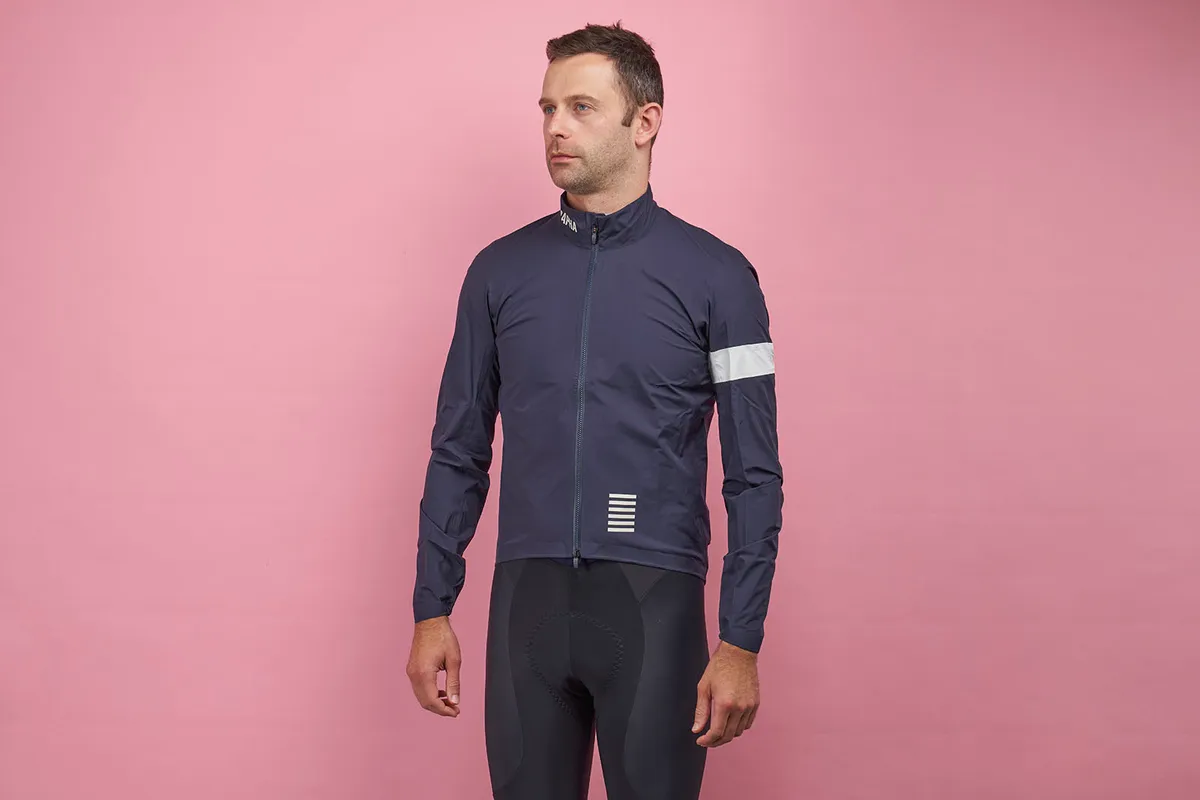
- £240 / $295 / €270 / AU$410 as tested
- Pros: Excellent rain protection; well-cut; comfortable fit
- Cons: Not the most packable
The Rapha Men's Pro Team Gore-Tex Rain Jacket uses lightweight, highly breathable Gore-Tex Active fabric and taped seams throughout.
Cut for serious cyclists, with Rapha’s slick look, it’s slim with a dropped tail and raised front for riding in an aggressive position.
The two-way AquaGuard zip gives easier access to jersey pockets and a covering strip stops draughts.
The rear waist hem is elasticated, while the front is designed to sit flat. With the underside elasticated, the cuffs take a similar approach and tuck neatly under a glove cuff.
There’s exceptional protection, with the fabric continuing to bead water off well following several washes.
It just about fits into a jersey pocket, but lacks pockets itself.
Universal Colours Mono Men's Rain Jacket
SQUIRREL_TEXT_13158170

- £170 / $220 / €205 as tested
- Pros: Competitive fabric performance; slim cut; fleece-backed neck; relatively good value
- Cons: Short torso
The Universal Colours Mono rain jacket is proof that you don’t need big-brand fabrics to make a great jacket.
It uses a fabric from Tech One Co Ltd, which is PFC-free, carries a 20,000mm water column rating and feels similar to Pertext Shield. Waterproofing is good and it's decently breathable. Even though Pertex Shield should outperform this fabric in terms of moisture release, the difference is hard to detect when you’re out riding.
The jacket is good quality and ultimately offers value for money. The slim cut might dissuade you, but fit is often a personal preference.
SQUIRREL_13158170
Van Rysel Men's Racer Ultralight

- £39.99 / €40 as tested
- Pros: Low cost; provides essential protection; decent cut; includes stuff sack
- Cons: Overwhelmed by prolonged rain; middling breathability
At only £40, this Van Rysel jacket could fulfill your needs without breaking the bank.
The jacket offers all the essential protection many will ever need. Or, in other words, it will protect you from showers long enough to get home. And it’ll pack down into its own stuff sack when you don’t need it.
The fabric, with its DWR treatment, resists medium-intensity showers, but it gets overwhelmed in heavier rain.
Our tester got a bit damp from moisture build-up when working hard, but the jacket helped him dry out quickly and he didn’t have a ‘boil-in-the-bag’ sensation. This was likely aided by the large rear vent.
- Read more: Van Rysel Men's Racer Ultralight review
Velobici Alfred jacket
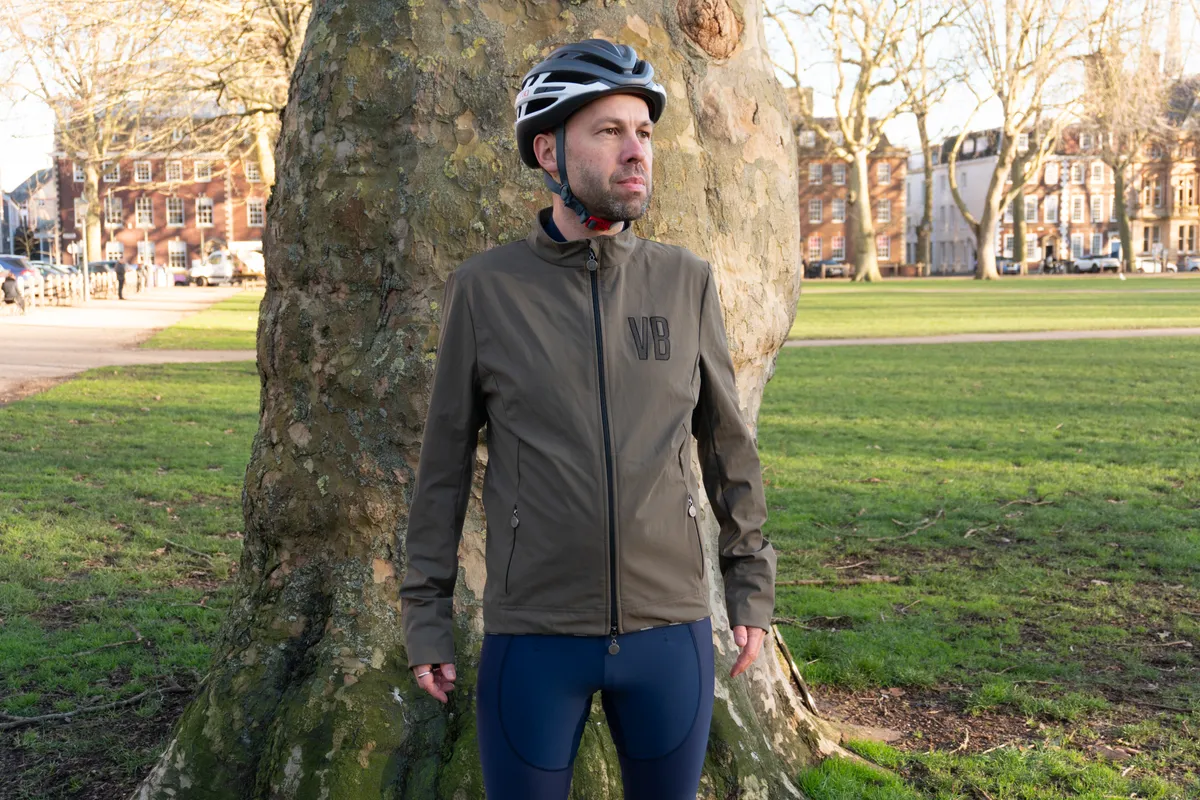
- £250 as tested
- Pros: Stylish and well constructed; perfect for commuting; waterproof material
- Cons: No taped seams
The Velobici Alfred waterproof jacket is almost too stylish to take down dirty lanes and gravel tracks.
The Alfred’s stronger suit is urban riding. Internal and external pockets, and reflective detailing boost its commuting practicality.
The absence of taped seams is a double-edged sword. This feature aids breathability at the expense of impermeability.
- Read more: Velobici Alfred review
How we test waterproof jackets for road cycling
We test every waterproof jacket we review out on the road to see how they perform in their natural habitat.
Our testers head out into the cold and wet to make sure the jackets won't let you down, and to identify their strengths and weaknesses.
Ultimately, our waterproof road cycling jacket reviews are based on the following criteria:
- Waterproofing – how well the jacket keeps water out
- Breathability – does the jacket vent perspiration to avoid moisture on the inside?
- Fit and cut – is the jacket cut out to be used on the bike and is it comfortable for long durations?
- Features – are there enough pockets and does the jacket have any extra features over others?
- Value for money – how does the jacket compare to others on the market? Does it represent a good deal?
Why you can trust BikeRadar
BikeRadar has been an authority on bikes and cycling tech since its inception in 2007, delivering the world’s best riding advice.
We have experts testing all types of bikes, parts, clothing and accessories, from road, mountain and gravel bikes to commuting, bikepacking and electric bikes.
Our reviews are always editorially independent – with no exceptions. Our reviewers comprehensively test all products in the real world, always reflecting on performance, value and the wider market when delivering their verdicts and review ratings.
We have more than 15,000 product reviews available at your fingertips, as well as expert buying, maintenance, training, skills, health and fitness advice.
Our annual Bike of the Year test is an industry benchmark and the BikeRadar team consists of some of the most experienced riders and testers in the business.
Waterproof jackets for road cycling and commuting buyer's guide
A waterproof jacket used to mean a hardshell garment made from a fabric that felt more like plastic. However, we’re now seeing the rise of the ‘jerket’ or rain jersey.
These are softshell jackets that feel like a jersey but use a waterproof membrane or DWR (durable water repellent) treatment to repel precipitation.
Things would be easier if it were simply a matter of keeping the rain out, but pedalling makes you hot and sweaty, and the heat and moisture you generate need an escape route.
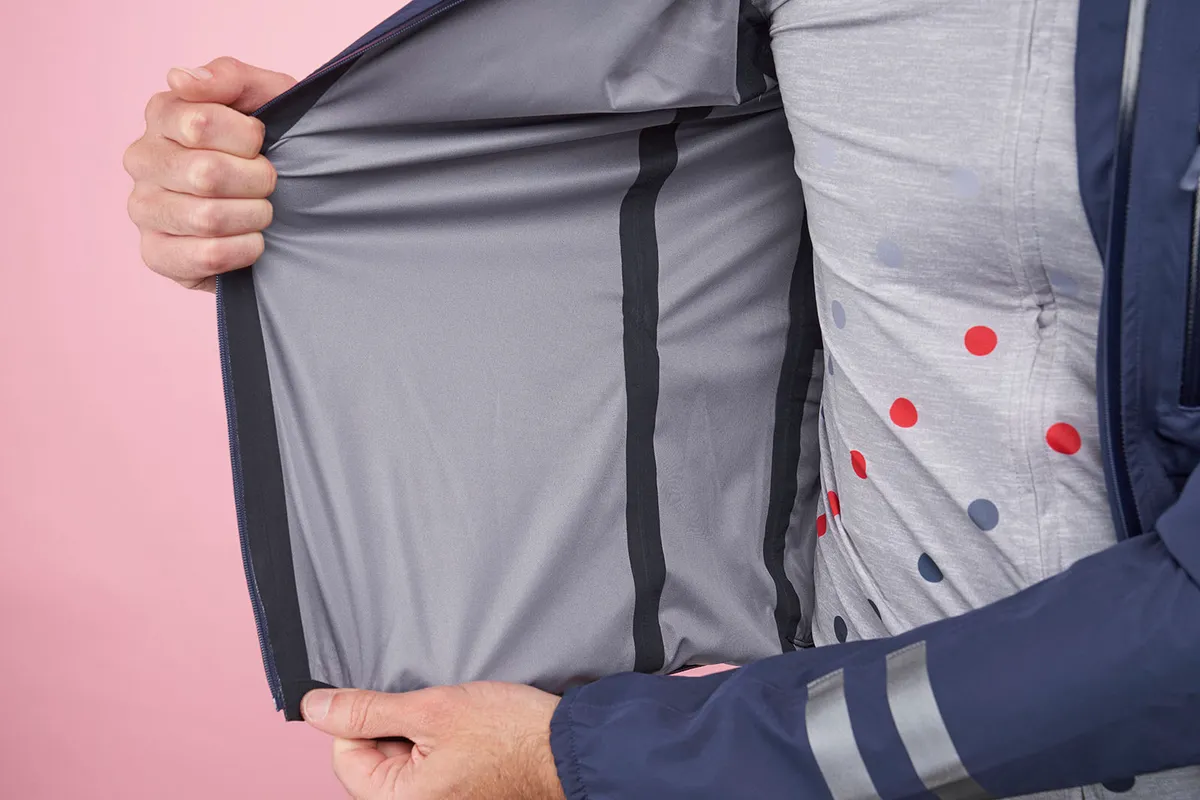
The trouble is, the properties that enable a waterproof jacket to keep the rain off also make it difficult to deal with the damp building up on the inside.
The ideal solution, therefore, is a cycling jacket that combines being waterproof with breathability. This is difficult, but by no means impossible.
Some garments manage it by using advanced materials, others solve the problem by incorporating vents into their designs.
Aside from being waterproof and breathable, it’s worth seeking out a jacket that packs down into a tiny package that’s easy to stow.
If the rain stops, you can take it off and put it away rather than keep wearing it long after it has done its job.
How waterproof fabrics work

Waterproof fabrics are either multi-layer laminate fabrics or regular woven fabrics that get a DWR treatment designed to keep water out. While both achieve the same goal, they work slightly differently.
DWR
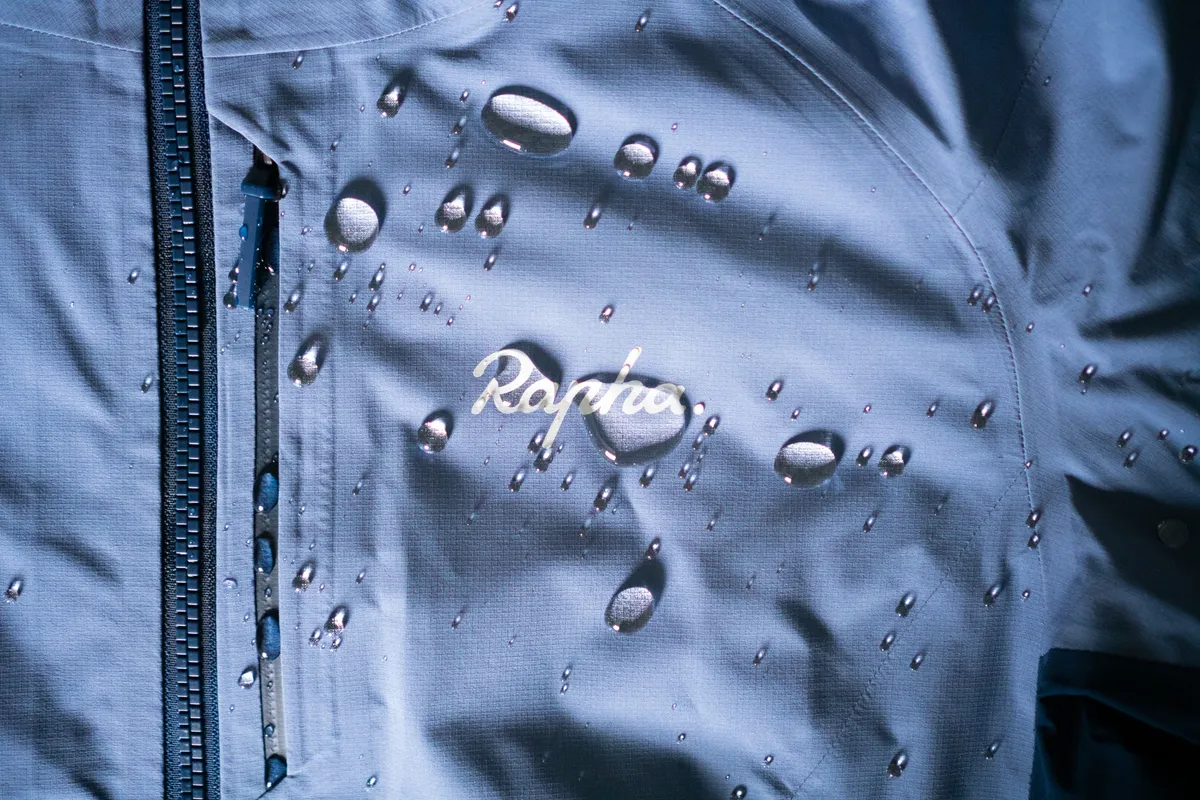
Durable water repellent, or DWR, is your wet weather gear’s first line of defence. It’s not a laminate or coating but a treatment applied to the fabric’s outer surface.
All waterproof garments, except those where the membrane is the outermost surface, receive a DWR finish.
The treatment does not inhibit breathability because it doesn’t fill the gaps between the fibres. Instead, it bonds the individual fibres to help the garment shed water and prevent saturation.
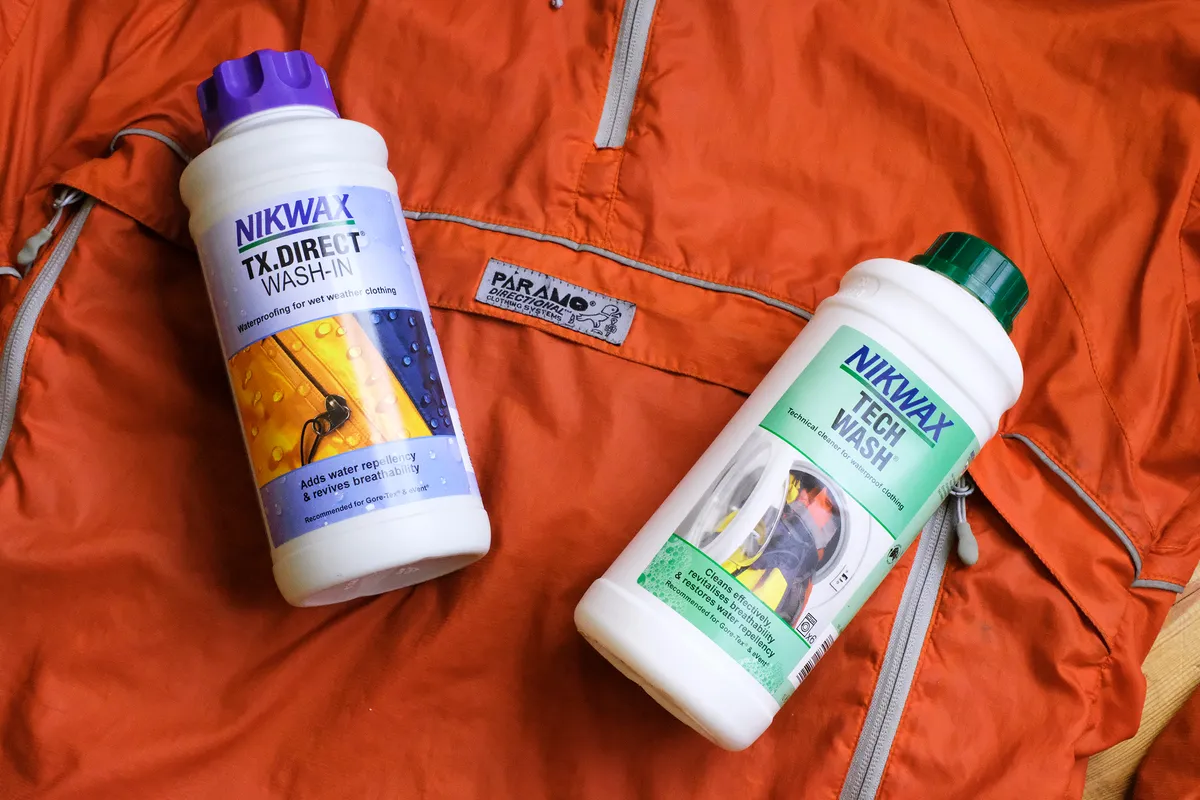
DWR treatments shed water by increasing the contact angle of moisture on a fabric, forcing a water droplet to maintain its surface tension; so when you see water beading on a fabric, the DWR is hard at work.
The coating wears off over time, accelerated by abrasions and some detergents. When this happens, the fabric no longer causes water to bead and will become saturated and heavy.
Not to fear, though, refreshing and retreating a garment is simple. There are plenty of spray-on or wash-in options available to rejuvenate your waterproof cycling gear.
Laminate fabrics
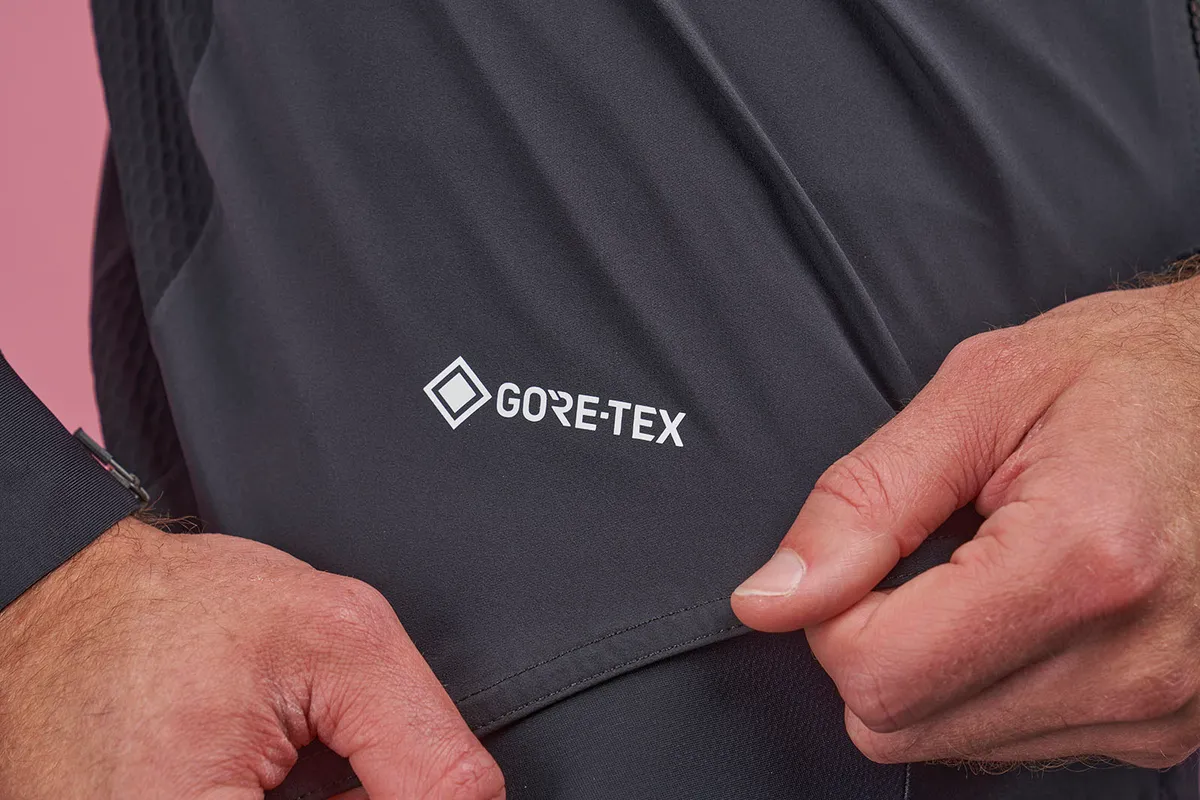
Most waterproof breathable fabrics are made from laminate materials. They consist of an inner fabric optimised for wicking moisture, a waterproof membrane and an outer-face fabric with a DWR treatment.
The inner membranes are full of holes big enough to allow water vapour from sweat to escape, but are too small for water droplets to sneak through.
These internal membranes are quite fragile, which is why there’s an abrasion-resistant layer on the outside of the garment.
This outer layer receives DWR treatment. As we mentioned before, the problem with DWR treatments is they eventually wash away, causing a jacket to ‘wet-out’, eliminating breathability.
Most outerwear today is based on this two-and-a-half or three-layer lamination, but we’re now seeing jackets eliminating the troublesome outer fabric.
This construction is becoming the go-to for high-end, cycling-specific jackets, with several big-name brands using versions from Gore-Tex.
What to look for when buying a waterproof cycling jacket
Waterproofing
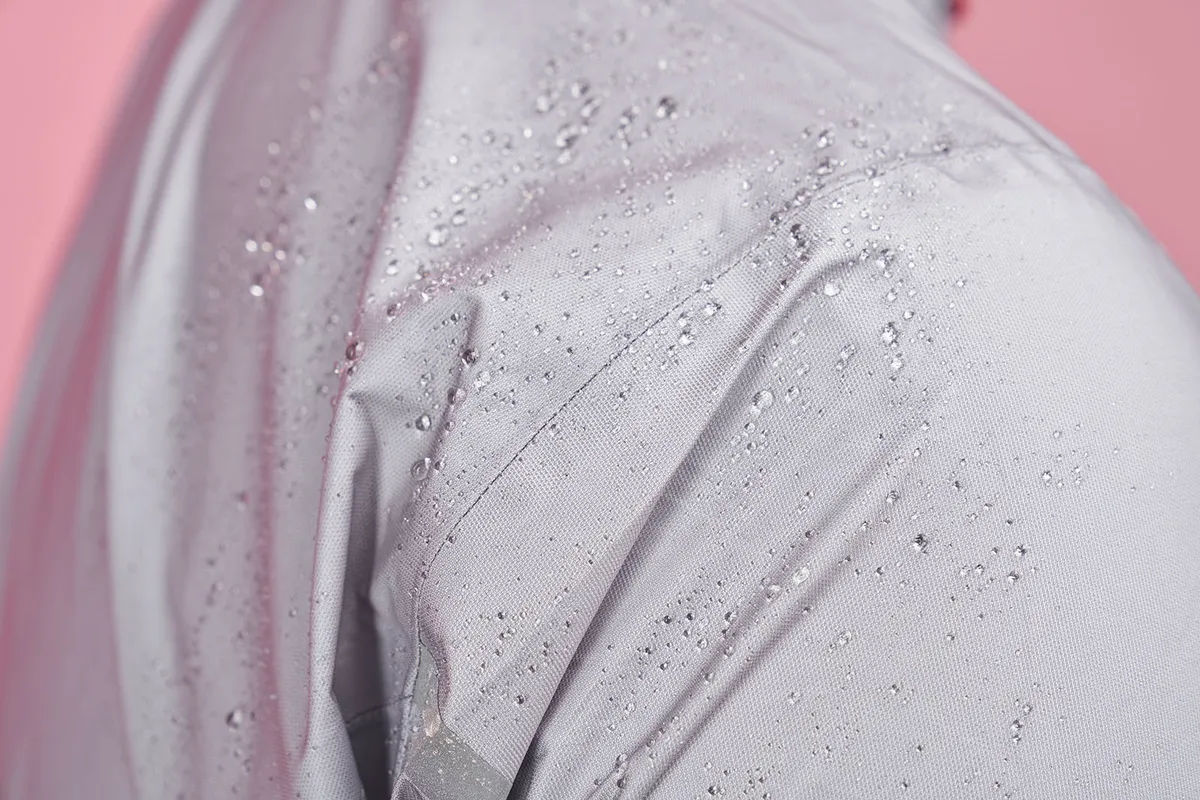
Waterproofness is generally measured in terms of how much water, in mm, can be placed on top of a fabric in a column until it seeps through (though some companies dispute whether this testing method accurately represents real-world conditions).
In simple terms, bigger numbers ought to mean the garment's fabric can withstand more water before any leakage occurs.
However, as with anything, the raw numbers don't always tell the full story. How a jacket is constructed plays a big role too, because water can also get in through poorly sealed seams or zips, or via the collar or sleeves if they don't fit correctly.
Breathability
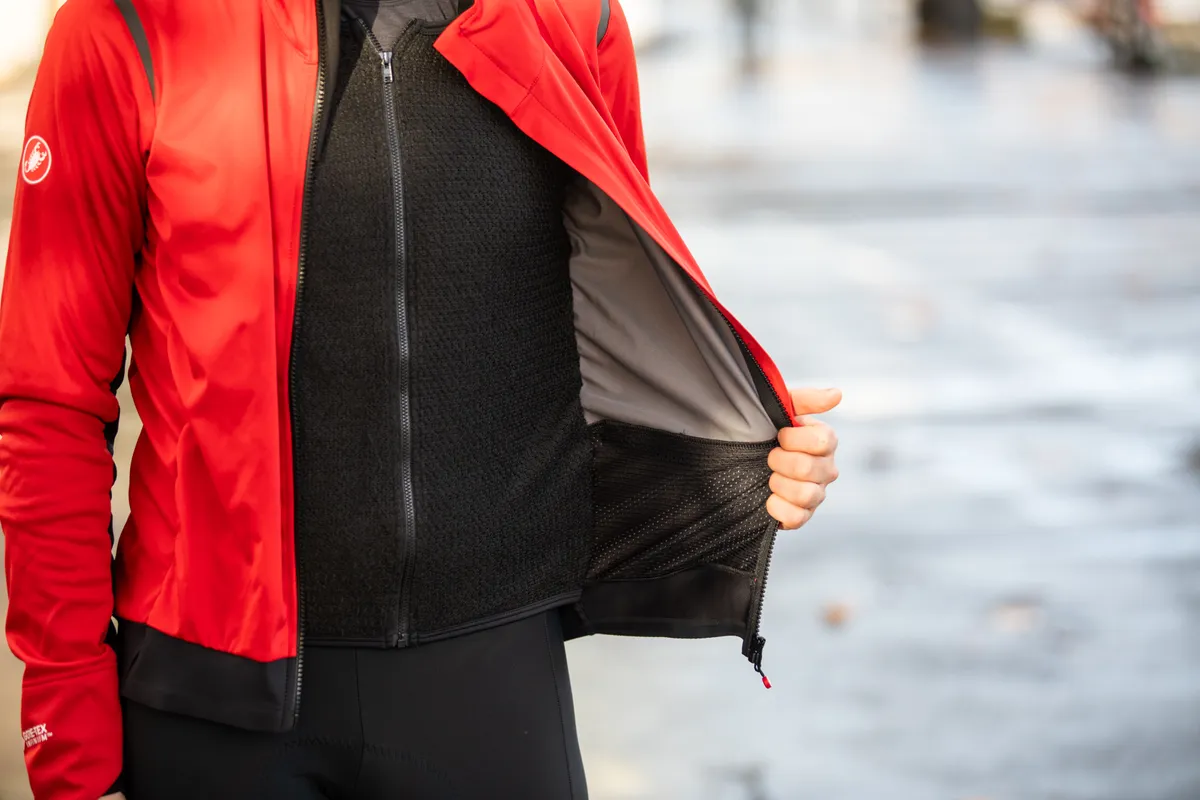
It’s no good keeping rain out if you get soaked by sweat from within. Different fabrics have different water vapour transfer rates, but cut, lining, membranes and vents all make a significant difference to how dry you stay.
Taping
Taping is used to seal the seams in a waterproof jacket on the inside. It adds bulk and reduces a jacket’s breathability, so some of the jackets in this list trade a bit of seam leakage for better overall performance.
Care
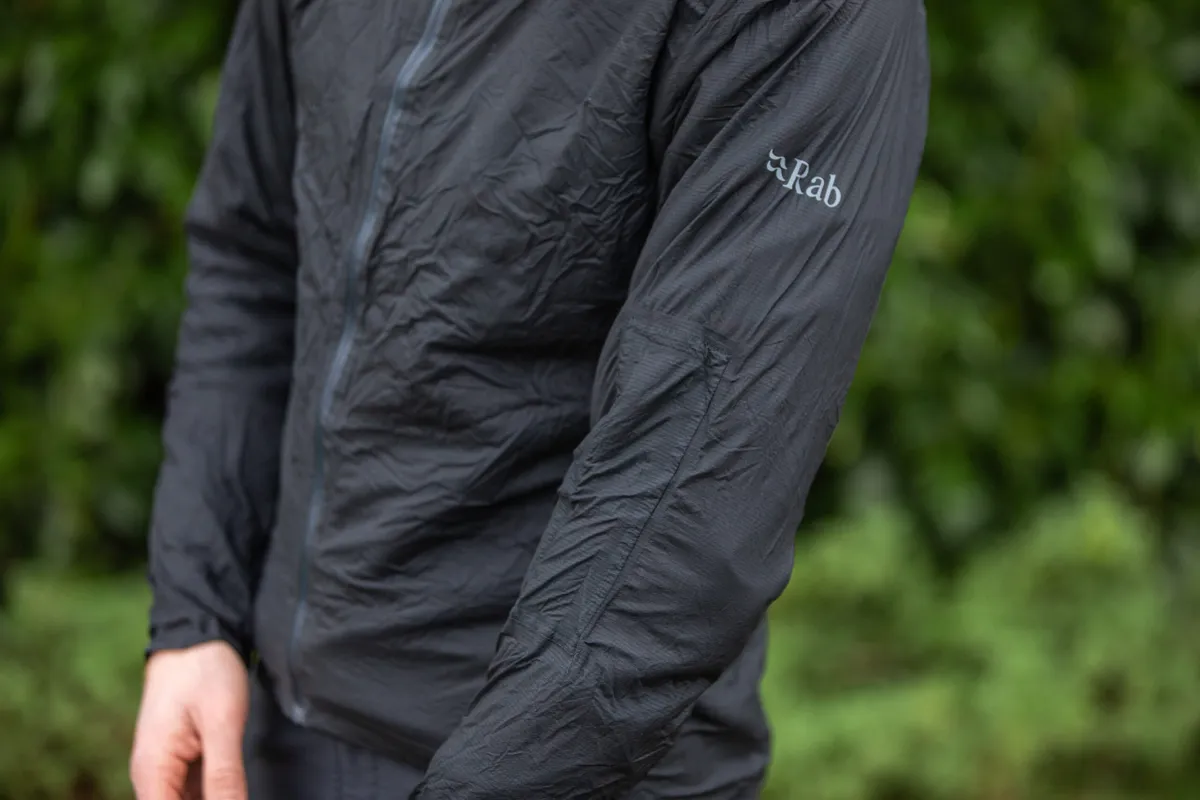
The worst enemy of your wet-weather gear is your washing machine. Detergents (biological ones especially) strip off waterproof coatings and conditioners clog the pores and fibres that help fabric wick and breathe.
Still, it’s important to keep waterproof fabrics clean because dirt and oil can clog membranes (limiting the fabric's ability to breathe) and degrade DWR treatments, too. To make your cycling kit last longer, always read washing instructions carefully.
Often overlooked is the outer DWR treatment. If your jacket is wetting out as described above, there are ways to revive the treatment on your jacket.
Some manufacturers say to throw the garment in the tumble dryer for a few minutes on low to medium heat, others recommend ‘touch-ups’ with an iron on the warm setting. Again, refer to the manufacturer’s instructions.
Finally, if the existing DWR treatment can’t be saved, you can re-treat it.
Features
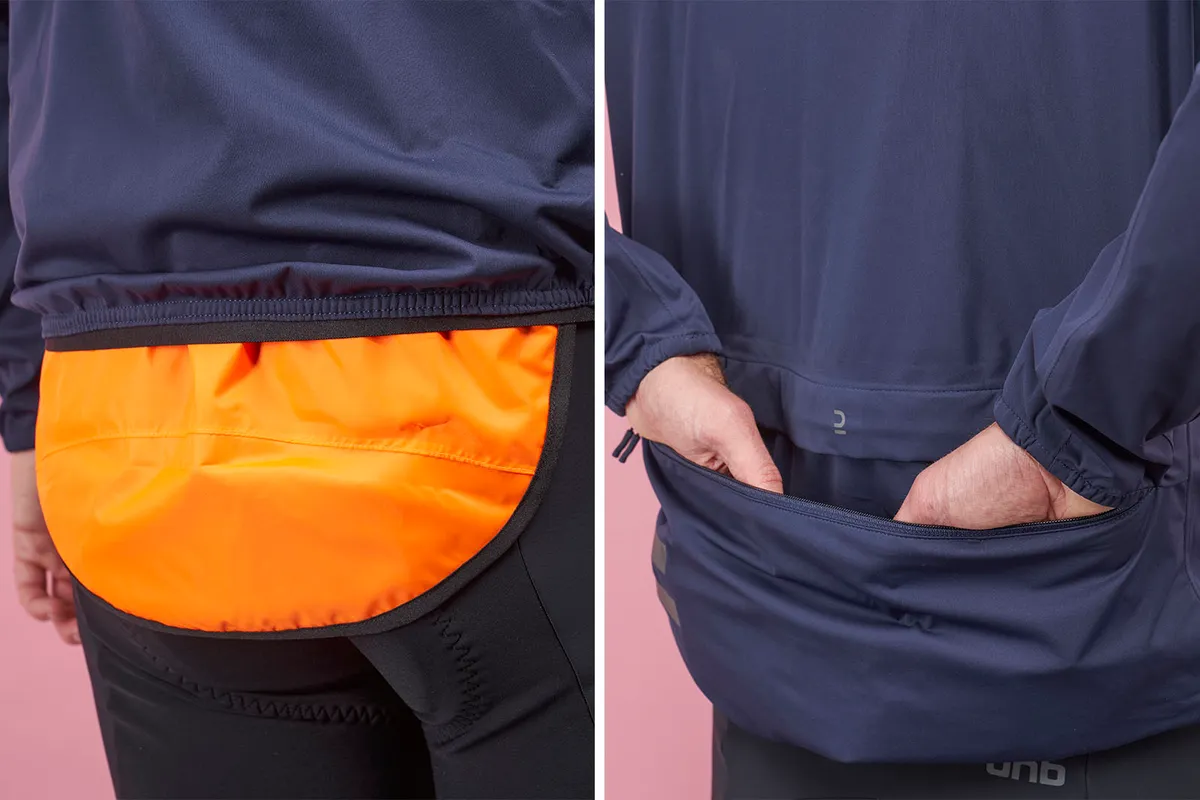
Pockets, hoods and zippered vents might seem like a good idea on a hanger, but not if they make a jacket too bulky to shove in your back pocket. Extra features all add to the cost too.
That said, features such as a dropped tail can protect your rear from road spray if you don't have mudguards, and reflective details can help keep you visible in low light, so consider which features you need for the type of riding you do.
Visibility
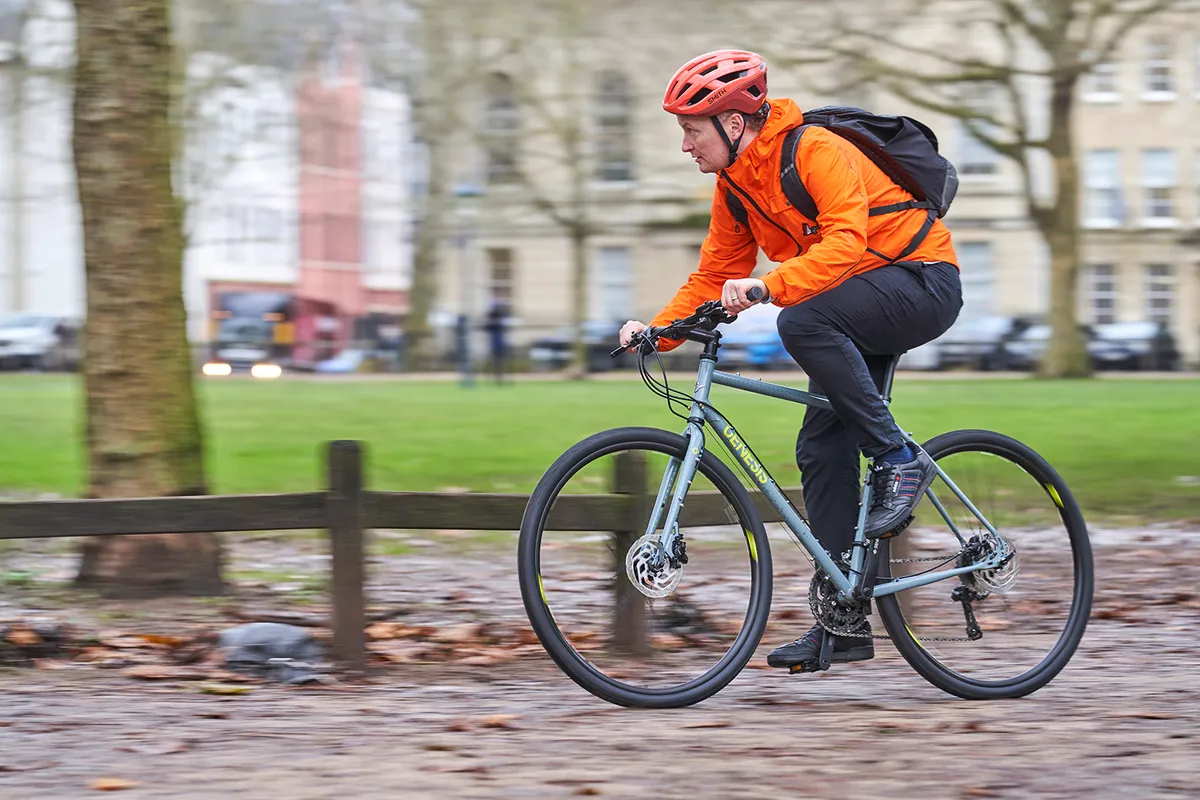
There's currently no requirement (in the UK at least) for cyclists to wear high-visibility clothing at any time of day or night (front and rear lights are a legal requirement in the UK at night, though), but for some it's an important consideration.
Whatever your opinion on the subject, it's always good to have choice and hi-vis doesn't have to mean fluorescent yellow anymore. Though it was once the case that the majority of waterproof cycling jackets were either clear, black or designed to look like building site safety equipment, many brands now offer waterproof jackets in a variety of bright, dare we say even fashionable, colours.
